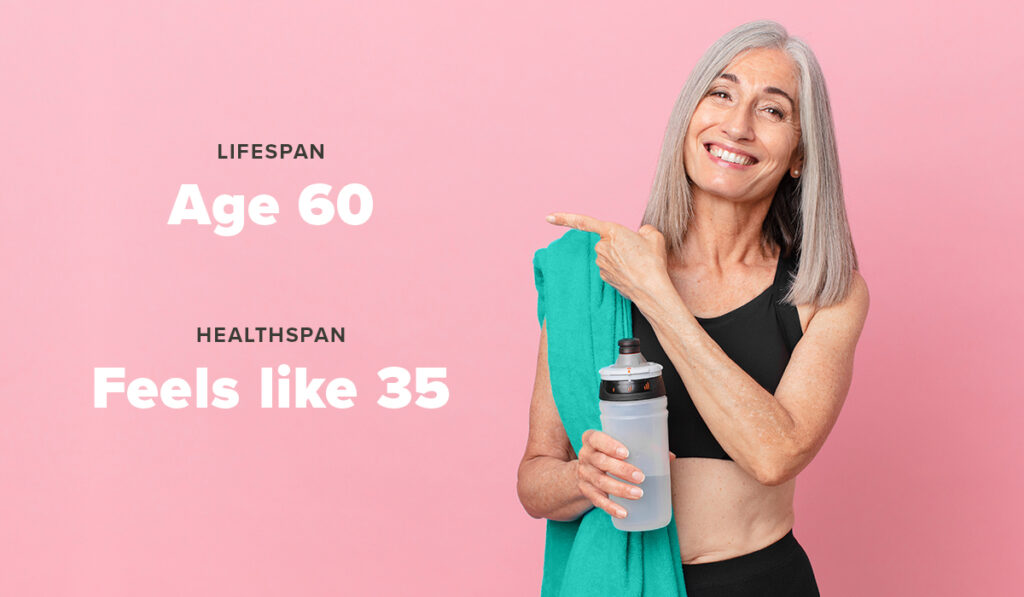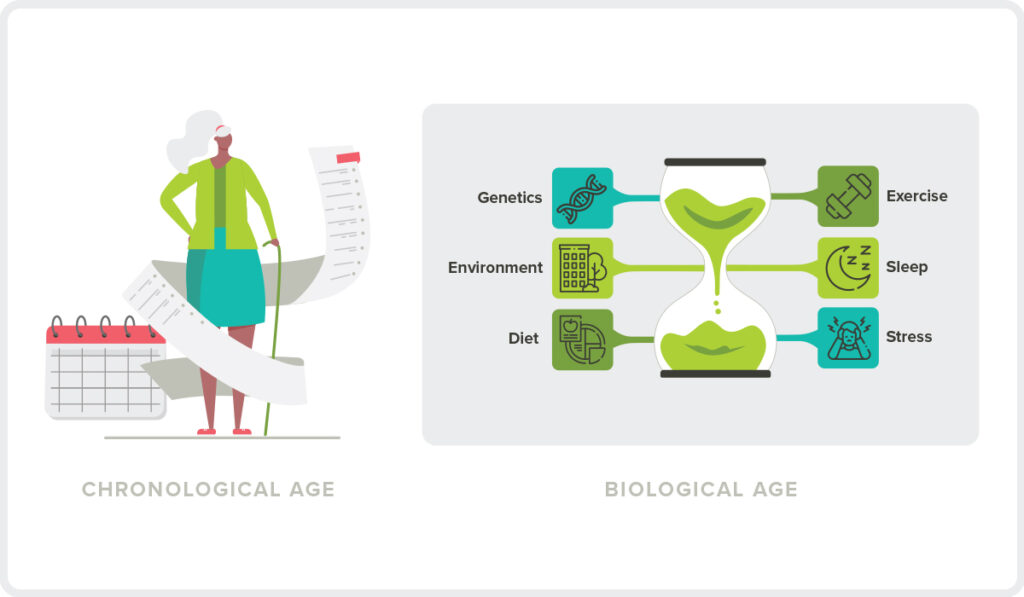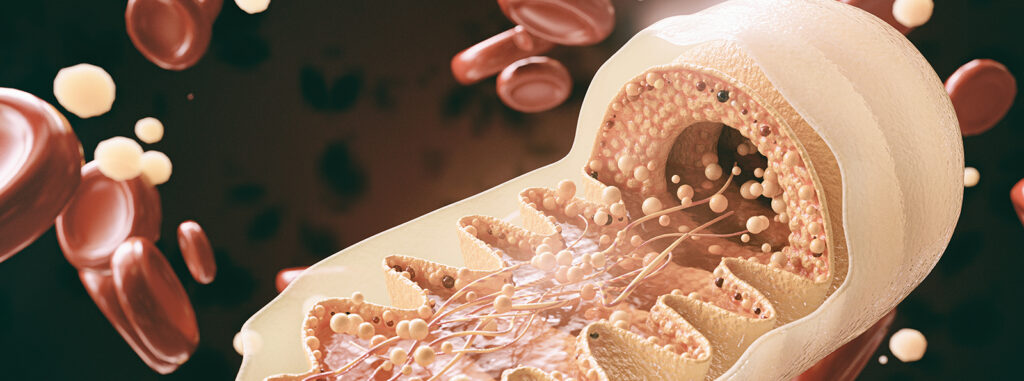Longevity and living longer seem to be all the rage right now. We are constantly working on advances in health and technology to increase our lifespan and add years to our lives. The problem is we don’t just want to live longer, we want to live longer and healthier lives.
That is where healthspan comes in. While lifespan is defined as the number of years someone lives, healthspan is the number of years someone lives free of chronic or debilitating diseases or disabilities associated with aging. Lifespan and healthspan are often used interchangeably, however they are not the same thing.
Let’s dive into the specifics of lifespan and healthspan.

Chronological Age Vs. Biological Age
Chronological age and biological age are terms used frequently when considering healthspan. Both of these terms describe different ways of measuring how old we are, however, someone’s chronological age can be very different than their biological age.
Chronological age is the number of years we have been alive since birth. Everyone’s chronological age increases at the same rate and this is something that we can not change.
Biological age refers to how old our cells are and how old our bodies feel which is influenced by factors such as our genetics, the environment, and lifestyle choices like diet, exercise, sleep, and stress level.
Biological age is a dynamic number that is continuously changing throughout our lifespan and can vary greatly, even amongst people of the same chronological age.

There are several methods to determine biological age such as DNA Methylation, looking at specific biomarkers, at-home tests, and online calculators that utilize self-reported health data and lifestyle factors to calculate biological age.
How Does Biological Age Relate to Healthspan?
There is a strong connection between our biological age and healthspan. A higher biological age might indicate a higher risk of developing certain age-related diseases such as diabetes, heart disease, and dementia.
Understanding your biological age can also help healthcare professionals tailor specific interventions, treatment plans, and preventative measures based on your individual needs.
Top 5 Factors Influencing Healthspan

The following list explains the top five factors that influence healthspan and what we can do to optimize each of these.
1. Nutrition
Nutrition may be one of the most important factors when it comes to aging and optimal health. Eating a balanced diet high in protein, vitamins, minerals, and antioxidants can go a long way in reducing inflammation and promoting healthy aging.
To optimize your own healthspan, first and foremost aim to stay hydrated and eat a diet rich in fruits, vegetables, low allergenic carbohydrates, and lean protein while limiting processed foods and sugary drinks.
Studies have shown that various forms of fasting or time-restricted eating as well as following the Mediterranean diet have been shown to improve healthy aging.
2. Physical Activity
As we age, exercise plays a very important part in the healthy aging process. Aerobic exercise improves cardiovascular health, cognition, and mood and promotes weight management while strength training improves bone density, increases metabolism, and boosts balance and stability. Engaging in regular exercise, both cardio and resistance training, is crucial for our physical and mental health.
3. Sleep
Adequate sleep improves cognitive function, enhances immune function, leads to better mental health, and improves physical performance. Aiming for 7-8 hours of good quality sleep per night is recommended.
4. Stress Management
Chronic stress can increase blood pressure, impair the immune system, disrupt the digestive system, and impair sleep. If chronic stress is impacting you, coping techniques like meditation, yoga, spending time with friends and family, and spending time in nature can be helpful. Working with a therapist or counselor to learn coping techniques and healthy ways to manage stress is also encouraged.
5. Genetics
Genetics are the one thing we can not change and sometimes we have to deal with the cards we are dealt, however, our lifestyle choices can still have a major impact on healthy aging. Don’t forget to attend regular preventive healthcare appointments and always address any health concerns as they arise.
To Recap
While much of the past century has been focused on increasing life expectancy, there has been more of a shift to focusing on healthspan, or healthy aging in recent years.
Focusing on lifespan alone ignores important factors such as chronic diseases, disability, and lack of quality of life.
Luckily, there is so much that we can do to improve our healthspan that will help us to not only increase the quantity of years that we live, but most importantly the quality of those years. Remember, consistency is key. By making these healthy habits a part of your daily life you will be well on your way to living a longer, healthier life.
Find the nutrition you need on this week’s menu.
SHOP NOW >
About the Author: Lindsay Cohen, RDN, LDN, CDCES, NBC-HWC
Lindsay is a St. Louis Based registered dietitian, certified diabetes care and education specialist and the owner of ABC Nutrition Solutions. She has personally been living with Type 1 Diabetes since the age of 9. Lindsay is passionate about making nutrition and wellness simple, straightforward and fun for readers and clients. When Lindsay isn’t writing or working with clients, she can be found spending time with her family and friends, trying out a new workout class, taking a walk while listening to an audiobook, traveling or exploring new restaurants.






